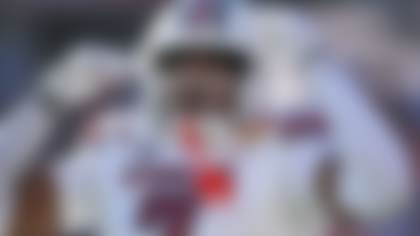CHICAGO -- Otis Wilson remembered the long days on the golf course with Dave Duerson.
It wasn't necessarily that they were spraying shots all over the place. It was that his old teammate always had something on his mind, particularly his children.
"Dave was just so proud of you guys," Wilson said during his eulogy Saturday, looking right at Duerson's three sons and daughter.
That's how Wilson chose to remember Duerson on Saturday -- not as the hard-hitting safety who terrorized receivers, not as the guy who helped that legendary 1985 Chicago Bears shuffle to the championship, and certainly not as the man who took his own life last week.
To the friends and family who jammed a Southside Chicago church for his memorial, he was simply a kind and generous man whose caring nature belied his reputation as a ferocious hitter.
A four-time Pro Bowl pick who played on Super Bowl winners with the Bears and New York Giants, Duerson committed suicide at his home in Sunny Isles Beach, Fla. He was 50.
Duerson's death rocked former teammates and coaches, who recently said he had seemed to be in good spirits after going through financial problems and a divorce the past few years. At a reunion of the 1985 Bears championship team a few months ago, he told them he was planning to get married again in April and seemed optimistic about his future.
His youngest son, Brock, gave one of several eulogies on Saturday, along with Wilson and the Rev. Jesse Jackson.
"My dad, Dave Duerson, was a kind and generous man who believed in helping others," Brock said. "Who would ever think that a small-town boy from Muncie, Indiana, would become such a success in sports, academics and business? I'm extremely proud to be a Duerson."
Wilson remembered Duerson as a guy who would "give the shirt off his back."
"He's always thinking, always working," Wilson said. "That's the thing. That's why we can't play because we ain't thinking about golf. That's just the type of person he was."
And Jackson, a friend, said, "At the end of the day, you're measured by the box score. ... When you look at the box, Dave was a winner."
Right to the end, his friends and relatives said. The way they see it, the fact that he made sure his brain would be donated for research shows who he really was.
It will be tested by the Center for the Study of Traumatic Encephalopathy at Boston University School of Medicine with the focus on chronic traumatic encephalopathy, a degenerative disease tied to depression, dementia and suicide. The condition has been found in numerous athletes.
"It's a wakeup call for a lot of people, when you think of concussions," said Emery Moorehead, a tight end on the '85 Bears team. "Dave played a long time -- played in college, played in high school -- and this could happen at any point in time. NFL safety, they really need to address this as well as in hockey and probably boxing, which has no regulations on these types of things. CTE is very different, and we're not aware of it."
Brock Duerson said the family will start a charity -- the Dave Duerson Foundation -- to help athletes deal with mental illness. He said the family won't get the results of the brain tests for three to six months.
Duerson starred at Notre Dame before getting drafted by the Bears in the third round in 1983. Two years later, with Todd Bell sitting out the season in a contract dispute, he became a starter on one of the greatest defenses ever assembled.
With Hall of Famers Mike Singletary, Dan Hampton and Richard Dent, the Bears left a trail of battered opponents on the way to the championship. Duerson did his part in the backfield with five interceptions and made the first of four straight Pro Bowls.
A year later, he picked off a career-high six passes while setting what was an NFL record for sacks by a defensive back with seven. That mark stood until 2005.
Duerson would go on to win another Super Bowl with the 1990 Giants after being released by the Bears, and spent three years with Arizona before retiring after 11 seasons.
He remained active in the union and served as a trustee on the NFL Players Association's retirement board. He clashed with Ditka over the way former players' claims were distributed, but the coach has said they eventually made up.
Duerson was also involved in several businesses after his career.
He owned a few McDonald's franchises and later helped to grow a company that supplied fast-food restaurants. He left to start his own company in 2002, and graduated from Harvard Business School's Owner/President/Management Program in 2001.
But his life had taken some hard turns the past few years.
His food-supply company was forced into receivership in 2006, and Duerson filed for divorce from his wife Alicia a year later. He lost his Chicago-area home to foreclosure and his position as Notre Dame trustee after pleading guilty to a misdemeanor domestic battery charge.
His brother Mike Duerson, 52, said after the memorial that he's donating his brain to the same Boston clinic. He said he's had health problems since playing college basketball his freshman year at IUPUI. He said he got a concussion after taking a charge and was paralyzed on his left side for six months.
"I've been diagnosed with just about everything -- they call it alphabet soup, as far as psychological problems," Mike Duerson said.
He said he hopes something positive comes out of his brother's death.
"I don't know if it's a wake-up call for the NFL," he said, "But it may be for colleges."
Copyright 2011 by The Associated Press



